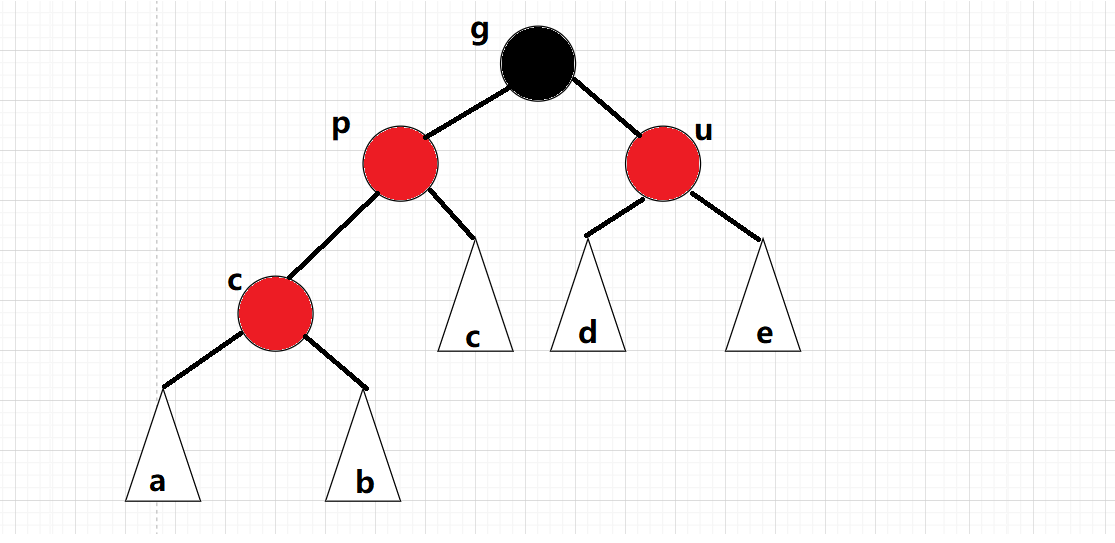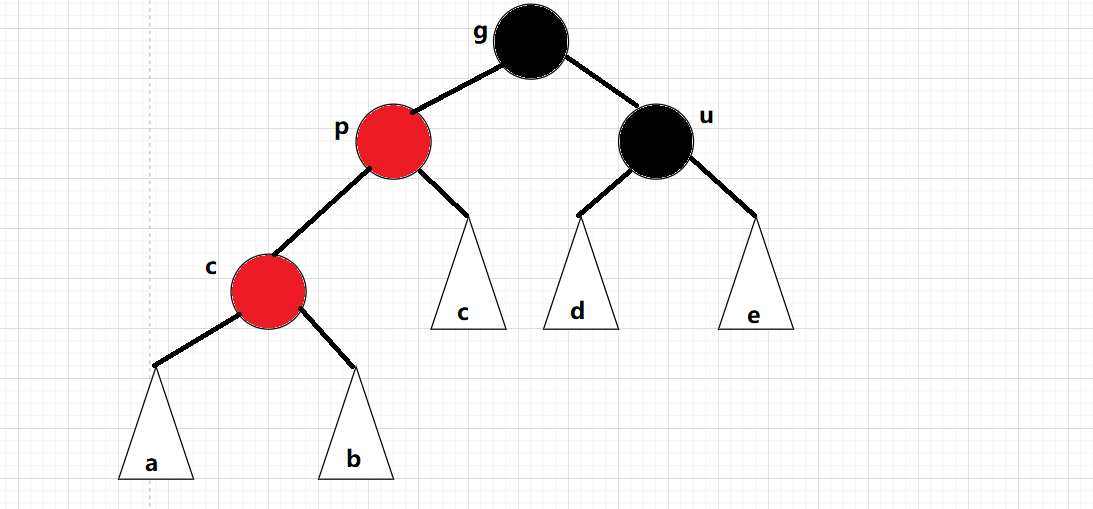一、红黑树的概念
红黑树,是一种二叉搜索树,但在每个结点上增加一个存储位表示结点的颜色,可以是Red或Black。 通过对任何一条从根到叶子的路径上各个结点着色方式的限制,红黑树确保没有一条路径会比其他路径长出俩倍,因而是接近平衡的 。(既最长路径长度不超过最短路径长度的 2 倍)
ps:树的路径是从根节点走到空节点(此处为NIL 节点)才算一条路径

二、红黑树的性质
-
每个结点不是红色就是黑色
-
根结点是
黑色的 -
如果一个结点是
红色的,则它的两个孩子结点是黑色的(没有连续的红色结点) -
对于每个结点,从该节点到其所有后代叶结点的简单路径上,均包含
相同数目的黑色结点 -
每个叶子结点都是黑色的(此处的叶子结点指的是空节点,NIL节点),如果是空树,空节点也是黑色,符合第一个性质
理解最长路径长度不超过最短路径长度的 2 倍:
根据第三个性质:红黑树不会出现连续的红色结点,根据第四个性质:从每个结点到所有后代结点的路径上包含相同数目的黑色结点。
极端场景:最短路径上全黑,一条路径黑色节点的数量,最长路径上是一黑一红相间的路径
三、红黑树节点的定义
三叉链结构,对比AVL数节点的定义,把平衡因子替换成节点颜色,采用枚举的方式:
//结点颜色
enum Color
{
RED,
BLACK,
};
template<class K, class V >
struct RBTreeNode
{
pair<K, V> _kv;
RBTreeNode<K, V>* _left;
RBTreeNode<K, V>* _right;
RBTreeNode<K, V>* _parent;
Color _col;
RBTreeNode(const pair<K,V>& kv)
:_kv(kv)
,_left(nullptr)
,_right(nullptr)
,_parent(nullptr)
,_col(RED)
{}
};
这里可以清楚的看到,构造结点时默认设置为红色,问题来了:
如果插入的是黑色结点那就是不符合第四个性质(路径上均包含相同的黑色结点),此时我们必须要去进行维护每条路径的黑色结点
如果插入的是红色结点那就是不符合第三个性质(没有出现连续的红色结点),但是我们并不一定需要调整,如果根刚好为黑色,就不需要进行调整。
所以如果插入为红色结点,不一定会破坏结构,但是如果插入黑色结点我们就必须去进行维护了
四、红黑树的插入
红黑树插入的操作部分和AVL树的插入一样:
- 找到待插入位置
- 将待插入结点插入到树中
- 调整:若插入结点的父结点是红色的,我们就需要对红黑树进行调整
前两步大差不差
因为新节点的默认颜色是红色,因此:如果其双亲节点的颜色是黑色,没有违反红黑树任何性质,则不需要调整;但当新插入节点的双亲节点颜色为红色时,就违反了性质三不能有连在一起的红色节点,此时需要对红黑树分情况来讨论
关键在于对红黑树进行调整:为了能够展示出各种情况,这里有一个基本的模型:

约定:cur为当前节点,p为父节点,g为祖父节点,u为叔叔节点
情况一:cur为红,p为红,g为黑,u存在且为红 :
cur为红,p为红,g为黑,u存在且为红

关键看u结点,根结点的颜色为黑色,不能有连续的红色结点,所以上面的情况已经出现连续的红色结点了,此时我们需要进行调整:
把p结点改为黑色,同时把u结点也改为黑色(符合性质四:每条路径上的黑色节点数量相同),最后在把g结点改为红色;如果g是子树的话,g一定会有双亲,为了维持每条路径上黑色节点的数量,g必须变红,不然会多出一个黑色节点,在把g结点当做cur结点继续往上调整,当g为根结点时,在把g置为黑色:

代码实现:
while (parent && parent->_col == RED)
{
Node* grandfater = parent->_parent;
if (parent == grandfater->_left)
{
Node* uncle = grandfater->_right;
//情况一:u存在且为红
if (uncle && uncle->_col == RED)
{
parent->_col = uncle->_col = BLACK;
grandfater->_col = RED;
cur = grandfater;
parent = cur->_parent;
}
else//其他情况
{
}
}
else//parent==grandfater->_right
{
Node* uncle = grandfater->_left;
if (uncle && uncle->_col == RED)
{
parent->_col = uncle->_col = BLACK;
grandfater->_col = RED;
cur = grandfater;
parent = cur->_parent;
}
else
{
}
}
}
_root->_col = BLACK;
情况二:cur为红,p为红,g为黑,u不存在/u为黑,gpc在同一侧:

此时u的情况:
如果u结点不存在,则cur一定是新增结点,因为如果cur不是新增结点:则cur和p一定有一个节点时黑色,就不满足每条路径都有相同的黑色结点的性质。
如果u结点存在,则其一定是黑色的,那么c节点原来的颜色一定是黑色,在其子树调整过程中变为了红色
如果p为g的左孩子,cur为p的左孩子,则进行右单旋转;
如果p为g的右孩子,cur为p的右孩子,则进行左单旋转,
同时,p、g变色–p变黑,g变红
以下情况:u不存在,cur为新增节点,进行右单旋:

以下情况:u结点存在且为黑:

情况三: cur为红,p为红,g为黑,u不存在/u为黑,gpc不在同一侧:

这时候我们就需要进行双旋了:
p为g的左孩子,cur为p的右孩子,对p做左单旋转;
p为g的右孩子,cur为p的左孩子,对p做右单旋转;
旋转之后则转换成了情况2,在继续进行调整即可

五、代码实现
送上源码:
#pragma once
#include <iostream>
#include <assert.h>
#include <time.h>
using namespace std;
enum Color
{
RED,
BLACK,
};
template<class K, class V >
struct RBTreeNode
{
pair<K, V> _kv;
RBTreeNode<K, V>* _left;
RBTreeNode<K, V>* _right;
RBTreeNode<K, V>* _parent;
Color _col;
RBTreeNode(const pair<K,V>& kv)
:_kv(kv)
,_left(nullptr)
,_right(nullptr)
,_parent(nullptr)
,_col(RED)
{}
};
template<class K,class V>
class RBTree
{
typedef RBTreeNode<K, V> Node;
public:
bool Insert(const pair<K, V>& kv)
{
if (_root == nullptr)
{
_root = new Node(kv);
_root->_col = BLACK;
return true;
}
Node* parent = nullptr;
Node* cur = _root;
while (cur)
{
if (cur->_kv.first < kv.first)
{
parent = cur;
cur = cur->_right;
}
else if (cur->_kv.first > kv.first)
{
parent = cur;
cur = cur->_left;
}
else
{
return false;
}
}
cur = new Node(kv);
cur->_col = RED;
if (parent->_kv.first < kv.first)
{
parent->_right = cur;
cur->_parent = parent;
}
else
{
parent->_left = cur;
cur->_parent = parent;
}
while (parent && parent->_col == RED)
{
Node* grandfater = parent->_parent;
if (parent == grandfater->_left)
{
Node* uncle = grandfater->_right;
//情况一:u存在且为红
if (uncle && uncle->_col == RED)
{
parent->_col = uncle->_col = BLACK;
grandfater->_col = RED;
//向上调整
cur = grandfater;
parent = cur->_parent;
}
else
{
//情况2
if (cur == parent->_left)
{
RotateR(grandfater);
parent->_col = BLACK;
grandfater->_col = RED;
}
//情况3
else
{
// g
// p
// c
RotateL(parent);
RotateR(grandfater);
cur->_col = BLACK;
grandfater->_col = RED;
}
break;
}
}
else//parent==grandfater->_right
{
Node* uncle = grandfater->_left;
//情况1:u存在且为红色
if (uncle && uncle->_col == RED)
{
uncle->_col = parent->_col = BLACK;
grandfater->_col = RED;
//向上调整
cur = grandfater;
parent = cur->_parent;
}
else
{
//情况2:u不存在/u存在为黑色
//g
// p
// c
if (cur == parent->_right)
{
RotateL(grandfater);
grandfater->_col = RED;
parent->_col = BLACK;
}
//情况3
// g
// p
// c
else
{
RotateR(parent);
RotateL(grandfater);
cur->_col = BLACK;
grandfater->_col = RED;
}
break;
}
}
}
//根变黑
_root->_col = BLACK;
return true;
}
void RotateL(Node* parent)
{
Node* subR = parent->_right;
Node* subRL = subR->_left;
parent->_right = subRL;
if (subRL)
subRL->_parent = parent;
Node* ppNode = parent->_parent;
subR->_left = parent;
parent->_parent = subR;
if (ppNode == nullptr)
{
_root = subR;
_root->_parent = nullptr;
}
else
{
if (ppNode->_left == parent)
{
ppNode->_left = subR;
}
else
{
ppNode->_right = subR;
}
subR->_parent = ppNode;
}
}
void RotateR(Node* parent)
{
Node* subL = parent->_left;
Node* subLR = subL->_right;
parent->_left = subLR;
if (subLR)
subLR->_parent = parent;
Node* ppNode = parent->_parent;
parent->_parent = subL;
subL->_right = parent;
if (ppNode == nullptr)
{
_root = subL;
_root->_parent = nullptr;
}
else
{
if (ppNode->_left == parent)
{
ppNode->_left = subL;
}
else
{
ppNode->_right = subL;
}
subL->_parent = ppNode;
}
}
void InOrder()
{
_InOrder(_root);
}
void _InOrder(Node* root)
{
if (root == nullptr)
return;
_InOrder(root->_left);
cout << root->_kv.first << ":" << root->_kv.second << endl;
_InOrder(root->_right);
}
bool Check(Node*root,int blackNum,int ref)
{
if (root == nullptr)
{
//cout << blackNum << endl;
if (blackNum != ref)
{
cout << "违反规则:本条路径的黑色结点的数量根最左路径不相等" << endl;
return false;
}
return true;
}
if (root->_col == RED && root->_parent->_col == RED)
{
cout << "违反规则:出现连续的红色结点" << endl;
return false;
}
if (root->_col == BLACK)
{
++blackNum;
}
return Check(root->_left,blackNum,ref)
&& Check(root->_right,blackNum,ref);
}
bool IsBalance()
{
if (_root == nullptr)
{
return true;
}
if (_root->_col != BLACK)
{
return false;
}
int ref = 0;
Node* left = _root;
while (left)
{
if (left->_col == BLACK)
{
++ref;
}
left = left->_left;
}
return Check(_root,0,ref);
}
private:
Node* _root = nullptr;
};
void TestRBTree1()
{
//int a[] = { 8, 3, 1, 10, 6, 4, 7, 14, 13 };
int a[] = { 16, 3, 7, 11, 9, 26, 18, 14, 15 };
//int a[] = { 4, 2, 6, 1, 3, 5, 15, 7, 16, 14 };
RBTree<int, int> t;
for (auto e : a)
{
t.Insert(make_pair(e, e));
}
t.InOrder();
cout << t.IsBalance() << endl;
}
void TestRBTree2()
{
srand(time(0));
const size_t N = 100000;
RBTree<int, int> t;
for (size_t i = 0; i < N; i++)
{
size_t x = rand();
t.Insert(make_pair(x, x));
}
cout << t.IsBalance() << endl;
}
本篇结束…



